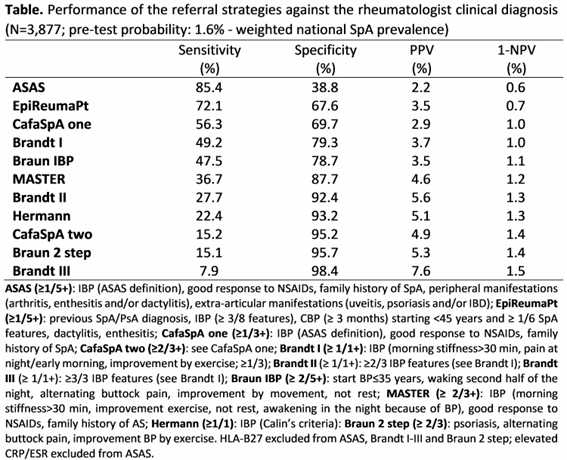Session Information
Date: Monday, October 22, 2018
Title: Spondyloarthritis Including Psoriatic Arthritis – Clinical Poster II: Clinical/Epidemiology Studies
Session Type: ACR Poster Session B
Session Time: 9:00AM-11:00AM
Background/Purpose: Several strategies have been proposed to promote early referral of patients with SpA, but consensus on the ‘best’ strategy is yet to be achieved. Moreover, few studies compared referral strategies (RS) head-to-head and none has neither evaluated these in a ‘nationwide’ setting (external validity) nor assessed the entire spectrum of SpA (i.e. axSpA and peripheral SpA). We aimed to evaluate the performance of the screening strategy for SpA of a nationwide epidemiological study (EpiReumaPt), as compared to previously proposed RS.
Methods: EpiReumaPt was a three-stage national health survey (2011-2013) where, in the first phase, 10,661 adult participants were randomly selected and interviewed using a structured face-to-face questionnaire that included screening for rheumatic diseases (RD), such as SpA. In the second phase, positive screenings for ≥1 rheumatic complaint plus 20% negative screenings were invited for an assessment by the rheumatologist. Finally, 3 rheumatologists revised all the information and defined the final diagnosis by consensus. All participants of the second phase were included (N=3,877). Each RS (table) was tested against the SpA revised diagnosis using the following metrics: sensitivity, specificity, positive predictive value (PPV), and post-test probability of disease given a negative test (1-negative predictive value). RS with an imaging (e.g. MRI) or laboratory component (e.g. CRP, HLA-B27) were modified (by excluding these components) given limited data obtained in the survey (table). A weighting factor was used to take the survey design into account.
Results: From the total 3,877 participants, 92 received a SpA diagnosis [weighted prevalence: 1.6% (95%CI: 1.2; 2.1)], 3,107 other RD diagnosis [e.g. knee osteoarthritis (31%)] and 678 no RD diagnosis. The ASAS RS was the most sensitive (85%) followed by the EpiReumaPt strategy (72%) (Table). The ASAS and EpiReumaPt RS had the lowest post-test probabilities of SpA in the presence of negative screening (0.6% and 0.7% respectively), thus, yielding a marked decrease in the probability of disease if negative [(1.6-0.6)/1.6*100=63%; (1.6-0.7)/1.6*100=56% respectively). On the other hand, the likelihood of SpA increased by 38% (2.2-1.6)/1.6*100) and 119% (3.5-1.6)/1.6*100) in case of a positive ASAS and EpiReumaPt RS, respectively. Brandt III was the least sensitive strategy in this study and not contributive to excluding SpA (1-NPV: 1.5%; pre-test probability: 1.6%), but expectedly increased the likelihood of SpA by 3.8 times if positive. The performance of the remaining RS is described in the table.
Conclusion: For the first time, a wide range of SpA RS were tested in a population-based setting where the ASAS and EpiReumaPt RS were shown to be the most sensitive. Our data suggest that these strategies can be effectively used as screening tools for SpA especially when laboratory and imaging data are not available.

To cite this abstract in AMA style:
Sepriano A, Ramiro S, Araújo F, Machado P, Rodrigues AM, Gouveia N, Eusébio M, Canhão H, Branco JC. Performance of Referral Strategies for Spondyloarthritis: A Population-Based Nationwide Study [abstract]. Arthritis Rheumatol. 2018; 70 (suppl 9). https://acrabstracts.org/abstract/performance-of-referral-strategies-for-spondyloarthritis-a-population-based-nationwide-study/. Accessed .« Back to 2018 ACR/ARHP Annual Meeting
ACR Meeting Abstracts - https://acrabstracts.org/abstract/performance-of-referral-strategies-for-spondyloarthritis-a-population-based-nationwide-study/
